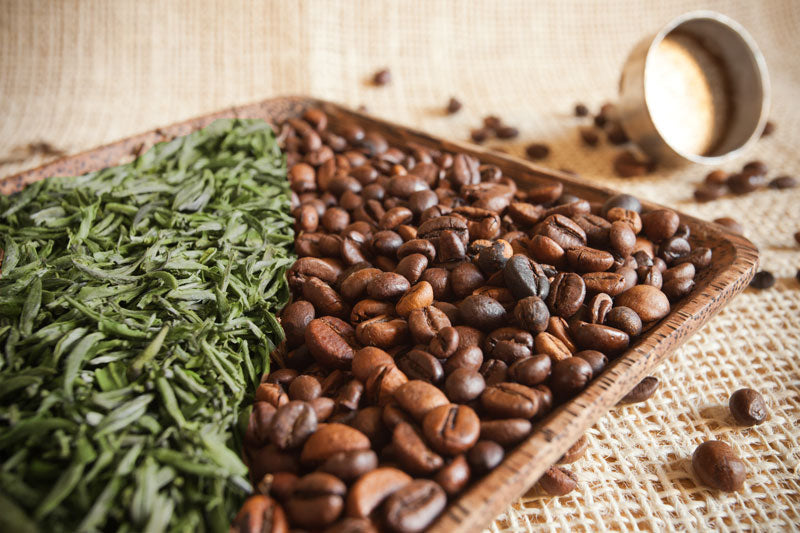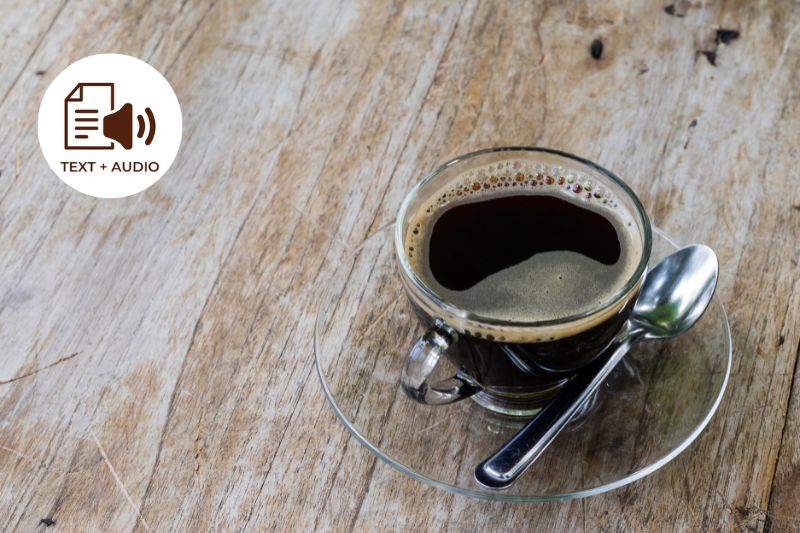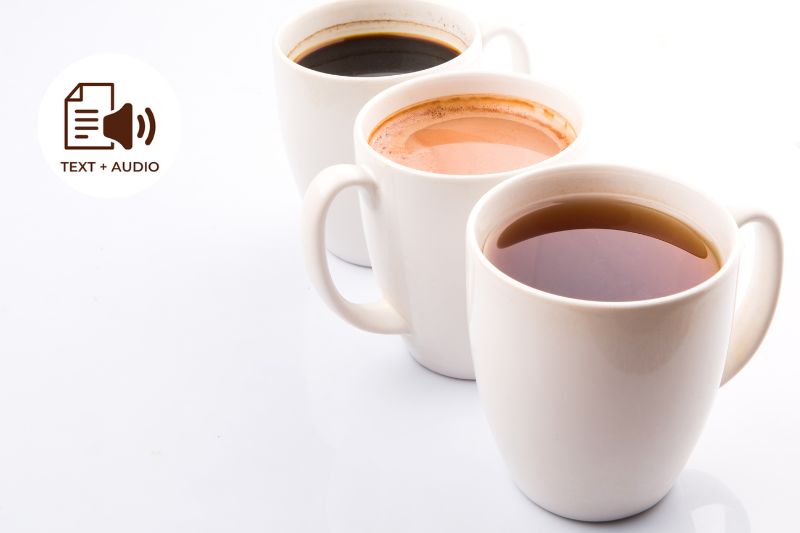Today I want to talk about something that might be an unpopular topic in the coffee circle; however, it is a question that every health-conscious coffee lover must ask – "Does coffee have any side effects?" And to answer that question, coffee does have side effects. At this point, many of my friends who have been reading my blog might raise an eyebrow and say, "Wait, didn't you say that coffee has health benefits?", "I thought you were recommending us coffee all the time?!" Yes, that is true as well. I would request you to keep in mind that even the most health-beneficial thing can become harmful for our bodies when applied in excess.

For example, we all know that exercise is good for us, but if we exercise too much, it can harm our health, such as speeding up the aging process by generating oxidative stress. It is the same with coffee – I would like you to remember that coffee, when consumed at the optimum level of intake, is beneficial for our health and daily activities. The side effect we will talk about today is the harmful effects of coffee on human health when consumed in excess. Now that the critical point has been established let's look at some of the burning questions you might have about the side effects of excessive coffee consumption.
Are we addicted to coffee?
One of the first questions I would like us to ask ourselves is – ‘Am I addicted to coffee?’ In today’s fast-paced lifestyle, many of us work long shifts during which we push ourselves to stay focused and busy. One of the most common ways we keep ourselves awake and active even when tired is by consuming caffeine through coffee. I believe many of us can relate to having a strong coffee in the morning, another after the morning meeting, and the next after the lunch break, and then it goes on and on until we lose count of how many coffees we have consumed during the day. Therefore, I want all of us to take a moment and reflect on how many cups of coffee we drink each day. Then we will compare it with the recommended and safe number of cups based on scientific data in the next section.
How much coffee is too much? (Based on scientific data)
The perception of 'too much coffee’ can be very subjective. For example, when I asked several of my friends how much coffee they would consider being too much, they all came up with very different answers. A friend who works night shifts and drinks almost 10 cups a day said it was okay since he is used to it. Another friend said he tries to avoid caffeine as much as possible and said he feels guilty even for the two cups of decaffeinated cappuccino he drinks every day. Finally, another friend who works as a roaster at a busy café said he doesn't even track how much coffee he drinks every day as he has to drink so many espressos as a part of his job.

As you can see, it is impossible to conclude how much coffee is excessive based on personal opinions. So we will go through some scientific data to help us make a more informed decision when it comes to how much coffee we can safely drink every day.
Dr. Sanjiv Chopra, former Faculty Dean for Continuing Medical Education at Harvard Medical School, states in his book ‘The Big Five: Five Simple Things You Can Do to Live a Longer, Healthier Life:”
’According to Mayo Clinic, four cups of coffee appear to be safe for most healthy adults. According to the American Medical Association (AMA), the standard daily coffee consumption is 2 to 3 cups; however, 10 cups is excessive. ’
In another large-scale scientific study involving 350,000 participants, it was found that drinking up to 4 cups of coffee every day has a beneficial effect on human health.
Based on these scientific data, we can say that up to 4 cups of coffee per day might be a beneficial amount of coffee for most of us. Having said that, I would like you to keep in mind that every coffee drinker is different, and the maximum amount of coffee that is beneficial can vary; this is because caffeine tolerance differs among people based on their genetic makeup.
The Japanese professor Suzuki Yu writes in his bestselling book “Super Stress Relievers – 100 Scientific Methods to relieve your stress”:
Genetics has a vital role in caffeine's effect, and many people are born with strong tolerance to caffeine.
According to research done by Harvard University school of public health, the effect of caffeine differs among people due to the following factors:
- Hyper/High caffeine sensitivity – Even less than 100mg of caffeine per day (1 to 1.5 cups of coffee) can cause side effects such as insomnia, anxiety, increased heart rate, etc.
- Standard/Medium Caffeine sensitivity – Can consume 200-400 mg of caffeine per day(2-3 cups of coffee) without any side effects. Most people fall in this range of caffeine sensitivity, and therefore most health guidelines suggest caffeine consumption to 300mg per day.
- Hypo/Low caffeine sensitivity – Can consume more than 500 mg of caffeine per day (more than 5 cups of coffee) without any side effects. Someone in this category can drink coffee right before bedtime and fall asleep without any trouble - 10% of the population fall in this group.
At this point, I believe we have a good amount of scientific data using which we can assess our caffeine tolerance level and use it as a guideline to decide how many cups of coffee we can safely consume every day. Let’s ask ourselves, “Do I feel anxious and hyper-active after one cup of coffee?”, “Do I sleep without any troubles even after drinking my post-dinner coffee?’
We can also conclude the following facts:
- Coffee does have some side effects when consumed in excess.
- However, the daily limit of safe coffee consumption is around 4 cups for most people.
- How much coffee we can drink every day varies among people due to genetics

What are the side effects of drinking too much coffee?
Although drinking coffee can have incredibly positive impacts on our bodies, it can have some severe side effects when taken in excessive amounts. Let's look at some of these below:
Excess amounts of caffeine can put a strain on the kidneys
In a study titled “Metabolites Associated with Coffee Consumption and Incident Chronic Kidney Disease," the metabolites in blood samples from 3800 participants were studied. It was found that there were 41 metabolites related to coffee consumption, and out of these, the presence of 3 metabolites in the body increased the risk of chronic kidney diseases significantly. In simple words, the result of this study was that excessive consumption of coffee could increase the risk of chronic kidney diseases.
In addition, coffee has diuretic effects, which can also strain the kidneys. Many of us might be able to relate to rushing to the washroom multiple times when we drink too much coffee. It is essential to maintain the body's water level above a certain level for keeping kidneys healthy. Drinking too much coffee makes us lose water from our bodies, causing stress on the kidneys.
Coffee also contains Potassium, and people with kidney damage cannot efficiently excrete Potassium. Hence, it is not such a good idea for someone with kidney issues to drink coffee excessively.
Excess amounts of caffeine increase levels of anxiety and stress
Most of us have experienced the feeling of energy boost and increased productivity after drinking coffee. How does coffee do that? This energy boost is mainly due to the ability of caffeine to block the release of neurochemical Adenosine. Adenosine is the chemical released in the brain which makes us feel tired. So, when caffeine blocks them, we feel refreshed and energized even when the body is supposed to feel tired. In addition, caffeine helps the body to release the hormone Adrenaline. By blocking Adenosine and releasing Adrenaline, caffeine helps us to feel energetic. However, when these two things happen excessively inside our brains, this can lead to anxiety and increased stress. In a study conducted with 25 healthy males, those who took 300mg of caffeine daily experienced more stress than those who took placebos.
Excessive caffeine intake can induce panic attacks anxiety and increase stress levels, especially in people with low tolerance to caffeine. Therefore, we must assess our levels of tolerance to caffeine. Let's ask ourselves again, "Do I feel strange and anxious when I drink too much coffee?', "How do I feel when I drink more than 3 cups of coffee?' If the answer to these questions is yes, we might want to take a break from drinking coffee for a while and see if it improves how we feel.

Excess amounts of caffeine can cause caffeine overdose.
Have you ever wondered how exactly coffee makes us feel so energized and 'awake' after drinking it? It is because of the caffeine in coffee, which is an alkaloid that can act as a powerful psychoactive drug on our brains. We might think, "Hmm? Is coffee a drug? That's hard to believe." And that is why let me discuss, in short, scientific research carried out by NASA, where the effect of four drugs – LSD, Speed, Marijuana, and Caffeine on a spider’s ability to weave a web was studied. This experiment found that caffeine had the most significant impact on a spider's brain, and when on caffeine, the spider could not weave a proper web, even though it could make a web while on other drugs. Incredible, right? Caffeine has a more powerful effect on the spider's brain than other known drugs. It is apparent that caffeine has a powerful impact on the brain, and we must be careful not to consume it in an amount that can cause a caffeine overdose. Now, how much caffeine can lead to a risk of an overdose?
According to Mayo Clinic, the standard level of coffee that a healthy adult can consume safely is about 400mg per day, which is around 4 cups of coffee. As we have discussed earlier, the tolerance level towards caffeine differs from person to person. However, if you start to feel these symptoms, it might be a sign that you have consumed caffeine in excess: dizziness, nausea, dry throat, insomnia, headache, fever, increased heart rate, etc. Among these symptoms, insomnia or difficulty falling asleep is a well-known side effect of caffeine. However, we hear stories of many people who switched from usual coffee to decaf coffee, and their long-term insomnia problem has been solved magically.
Many books on sleep improvement recommend abstaining from caffeine after lunch hours. Why is that? The half-life (the time it takes of the active substance of a drug to reduce by half) of caffeine is about 5 hours. So, for example, if you drink a post-dinner coffee (100mg) around 7 pm, at 10 pm when you might be going to bed, there is still 50mg of coffee left in your bloodstream! No wonder why it can be challenging to fall asleep when you drink coffee in the evening. That is why it is good to limit coffee intake to mornings and noon.
Coffee is not the bad guy – Amazing health benefits of drinking coffee
Although we have been looking at the side effects of coffee, I request you not to think of coffee as the bad guy here. When consumed at the standard level, it can provide amazing health benefits. Some of the most remarkable merits of coffee are as follows:
- Lowers mortality rate
- Boosts our performance
- It makes us feel better mentally
- Refreshes the brain
- Improves oral hygiene
- Reduces the risk of type-2 Diabetes
In addition, coffee has beneficial components other than caffeine. For example, it contains antioxidants, polyphenol, and healthy fatty acids. You will be impressed that coffee contains more than 1000 different types of plant-based compounds. According to a review article published in a medical journal from New England, the beneficial compounds in coffee improve heart and liver health, maintain insulin levels, improve mental health, and lower certain cancers' risk.
Since coffee has so many merits for our health, there is no reason to cut off coffee consumption from our daily lives completely. On the contrary, by consuming the optimum amount of coffee every day, we can continue to enjoy our beloved coffee drinks and benefit from the countless merits of drinking coffee.
Final words
In summary, we can say that coffee is highly beneficial to our health. However, we cannot use excuses such as 'Oh, it is good for my body, or '-because I am too sleepy,' or 'I need to stay focused' as a reason to consume coffee in excess. Drinking coffee in excessive amounts can have negative side effects on our bodies. So, let’s keep in mind what we learned today and try to find that ‘sweet-spot’ of the amount of coffee our caffeine tolerance levels allow us to consume safely every day. If we do this, we can all enjoy coffee in a way that keeps us happy and healthy in mind, body, and spirit!
Get Free Bonus Books

Sign up for free to the Coffee Club to get advice and exclusive articles about how to choose Japanese Coffee, and tips, tricks, and recipes for enjoying Japanese coffee.







